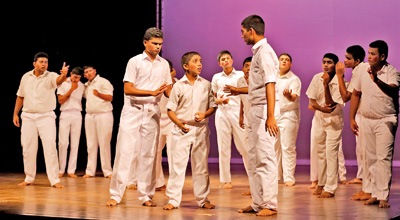Bearing it all: An out of the ordinary performance
After having fought hard in a competitive finale, it was Trinity College that claimed the coveted winning title in the Boys’ category at the recently concluded Shakespeare Drama Competition organised by Colombo YMCA and Rotary Club of Colombo North.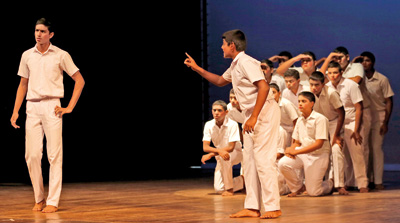
The school put on a rendition of the famous ‘Romeo and Juliet’ that stood out, due to their uniquely minimalist set and a carefully crafted stage presence. This week, we conversed with the cast and director, who gave us an insight into their journey.
Director Aslam Marikkar, who had recently begun working at the school, was quick to notice the eagerness of the students towards drama.
Funnily enough though, at the onset Aslam had thought the students wanted to skip the competition this year. Then one day at the beginning of the third term, the senior students appeared at the staff room and told him they wanted to participate. “My reply was fine if only you can commit.They were an amazing group of guys to work with. They stayed true to their word,” he recalls.
The idea to stage ‘Romeo and Juliet’ had come with the song that the cast performed at the end of the play, Aslam tells us. He adds this was an original track, which was composed by the school’s choir master Lasantha Tennakoon. The tune which is performed at Act 1 Scene 5, is sung according to the exact text in the script.
“I believe this is the first time something like this was done with a Shakespeare text.” We talk about the decision to keep the set to a minimum. As Aslam puts it, he felt the story was the important aspect that needed to be focused on and this is clearly explained through the text. Therefore, when it came to directing the play, he simply guided the students to let the text come to life through the acting. And the cast took it from there.

Aslam

Kavan. Pic above and below courtesy Aabid Jameel
The audience was left to form a mental picture of the props and setting. “Consider the performance a connect-the-dots drawing, that every individual could decorate to their fancy,” he explains. He adds they were lucky since the school uniform is white, “just like a blank canvas.”
An onlooker would’ve also observed that all the sound effects were created on stage by the entire cast themselves. Aslam recalls that most of the music was in fact done while they were playing around at rehearsals. For example, “the sound of birds chirping was thought of by a senior prefect who spent an evening at rehearsals with us. The beat boxing was bad discipline timed at the right moment.”
Aslam is grateful to the parents and the junior and middle school teachers that gave the students the courage to take to the stage and also to Principal, Andrew Fowler-Watt for his vehemence in wanting to promote the arts at Trinity College. Some of the cast members also gave us an insight into the production. Given the minimalist setting of the drama, they did feel it was a challenge. Nevertheless, this was achievable.
“We didn’t have to worry about props or costumes obviously. But we did have to work very hard on getting our choreography, timing and everyone’s background acting perfect,” Kavan Ranaraja (Romeo) tells us.
He felt their setting brought out the creative side of the whole cast, as it somewhat forced everyone to contribute to the production in one way or another, in addition to their usual acting.
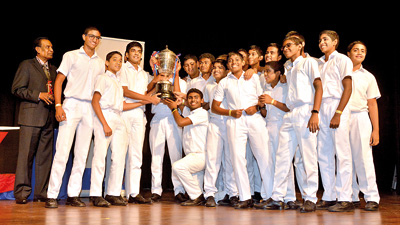
A jubilant Trinity Cast. Pix by Indika Handuwala and Sameera Weerasekera
“We think that it really helped us all as actors and made us more conscious of our stage presence.” he says.
The make or break element to any Shakespeare production is how successfully Shakespeare’s words are brought to life. The cast tell us their goal was to simply understand the dialogue and present it exactly as it was meant to be presented, namely as a “conversation between real people without focusing on unnecessary glamour.”
Their plan succeeded in the end. Winning the trophy after a lapse of fourteen years felt unreal for a moment, the boys recall. This was a performance that was unlike anything they had ever done before, and “it had won us the competition.”
The victorious feeling hasn’t sunk in for the cast as of yet. But, as they go about their daily school activities, they cannot help but feel proud of everyone for what they all achieved together.
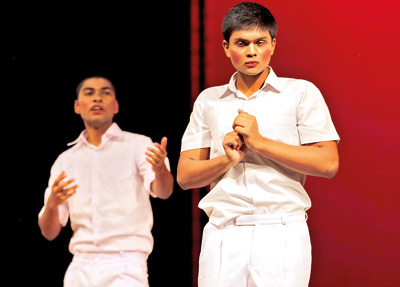
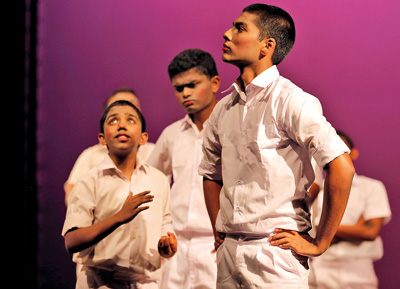
To watch the performance by Trinity College scan the code
